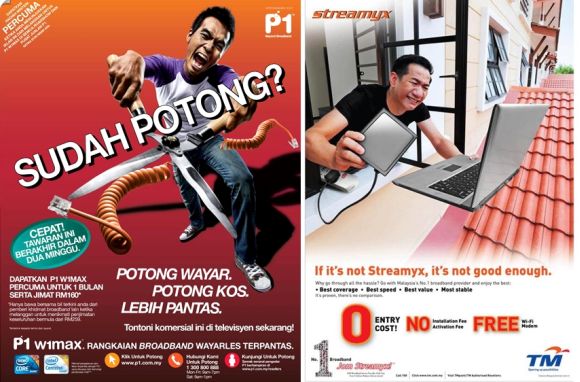UPDATE: TM invests RM350 million for 57% stake in P1 to roll out LTE services. More details here.
TM — Malaysia’s largest broadband service provider — is expected to announce its acquisition of P1 — a long struggling 4G operator — to the tune of RM2 billion today but many may not know that the two were once fierce competitors.
Back in 2009, P1 under the helm of Michael Lai (who was previously the CEO of now defunct TMNet), was a vibrant, fledgling operator right at the cutting edge of wireless technology. P1 was the first operator in the region to launch a WiMAX network. From an unknown, P1 grew to become a serious player in the wireless space with one of the largest and fastest growing WiMAX networks in the world. With that P1 enjoyed a healthy growth in subscribers. The new operator made all the right moves and seemed unstoppable
With Michael Lai as CEO, P1 was ambitious. Back then WiMAX was seen as the one technology that could deliver speed and performance that’s on par to fixed broadband solutions and P1 believed it could take on a giant in fixed broadband services. Michael was confident it could take on Telekom Malaysia.
It was David versus Goliath. A fast growing, greenfield operator that had a lot of verve but with limited resources taking on the nation’s old guards of broadband with massive resources. It was an entertaining match-up that gave us the memorable “Potong” campaign where P1 called Malaysians to cut the wires of fixed broadband and moved to wireless.
Obviously TM wasn’t going to take it lying down and it responded with an equally cheeky campaign making fun of some of the issues that P1 had with its wireless network.
P1 had its day with the Potong campaign. The brand sky-rocketed from an unknown to a household name and the promise of wireless freedom resonated with Malaysians.
That was five years ago. The broadband landscape is much different now. Since then, TM has strengthened its market position with UniFi, other wireless operators have adopted the more widely accepted 4G LTE standard and P1 was stuck in a rut, struggling to grow its base and its network.
Today’s acquisition announcement is interesting because many industry seniors hark back at the epic battle that TM and P1 once had. Many made jokes that a company that once wanted to “potong” so bad now has no choice but to “sambung balik” with TM but is that really the case? Perhaps not.
Fixed broadband while still in demand, is a stagnant market in Malaysia and the acquisition of P1 is important to TM as it looks to diversify its business beyond fixed broadband services. TM will gain access to valuable spectrum that will allow it to roll out 4G LTE services.
TM has set an ambitious target for its wireless business. By 2017, the operator wants to have 1 million wireless subscribers and the acquisition of P1′s 2.3GHz and 2.6GHz spectrum will be key to this goal. By acquiring P1, TM will not only have access to P1′s existing customer base but also to P1′s valuable infrastructure that consists of over 2,000 base stations nationwide including East Malaysia.
So did P1 sambung balik with TM or is TM finally embracing potong and going wireless? We can’t help but feel that Michael Lai is smiling.







